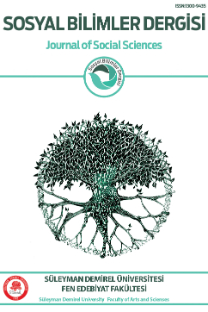A Struggle for an Independent Identity for Two: Mrs. Warren’s Profession
Bernard Shaw, Mrs. Warren’s Profession, Motherhood, Prostitution, Independent Identity
___
- ADERINTO, Saheed, “The Girls in Moral Danger: Child Prostitution and Sexuality in Colonial Logos 1930s to 1950”, Humanities and Social Sciences, Vol. I, 2007, p. 1-22.
- ASPEVIG, Kristen Antonia Harris, Fact and Fiction: Representations of Prostitution in contemporary British news media and novels, Unpublished PhD Thesis, Ryerson University, Toronto, 2011.
- BAKER, Stuard Eddie, Bernard Shaw’s Remarkable religion: a Faith That Fits the Facts, University Press of Florida, Gainesville, 2002.
- BERST, Sharles A., “Propoganda and Art in Mrs. Warren’s Profession”, ELH, Vol. XXXIII, 1996, 390-404.
- BLOOM, Harold, Comprehensive Research and Study Guide Bloom’s Major Dramatists George Bernard Shaw, Chelsea House Publishers, PA, 2000.
- BRESSLER, Charles E., Literary Criticism: An Introduction to Theory and Practice, Prentice Hall College Div., New Jersey, 1999.
- CHAMBERS, Colin, Continuum Companion to Twentieth Century Theatre. London: Continuum Collections, London, 2002.
- CODY, Gabrielle H.-SPRINCHORN, Evert, The Columbia Encyclopedia of Modern Drama, Vol. II, Columbia University Press, New York, 2007.
- DAVIS, Simone Weil, Living Up to the Ads: Gender Fictions of the 1920s, Duke University Press, London, 2000.
- DIERKES-THRUN, Petra, “Incest and the Trafficking of Women in Mrs. Warren’s Profession: “It Runs in the Family””, ELT, Vol. IL(3), 2006, 293-310.
- EDLUND, Lena-KORN, Evelyn, “A Theory of Prostitution”, The Journal of Political Economy, Vol. CX(1), 2002, p. 181-214.
- GOLDMAN, Lawrence, Science, Reform and Politics in Victorian Britain, Cambridge University Press, Cambridge, 2004.
- GÖZE, Ayferi, Siyasal Düşünceler ve Yönetimler. İstanbul: Beta Yayınları, 2005.
- GRIFFITH, Gareth, Socialism and Superior Brains: The Political Thought of Bernard Shaw, Routledge, London, 1993.
- GUY, Josephine M., The Victorian Age-An Anthology of Sources and Documents, Routledge, London, 1998.
- INNES, Christopher, The Cambridge Companion to George Bernard Shaw, Cambridge University Press, Cambridge, 1998.
- IRVING, John D., Mary Shaw, Actress, Suffragist, Activist (1854-1929), Arno Press, New York, 1978.
- JAIN, Sangeeta, Women in the Plays of George Bernard ShawT, Discovery Publishing House, New Delhi, 2006.
- JOHNSON, Katie N, Sisters in Sin: Brothel Drama in America, 1900-1920, Cambridge University Press, Cambridge, 2006.
- KAMMERER, Percy Gamble, “The Unmarried Mother: A Study of Five Hundred Cases”, Criminal Science Monographs, No. 3, 1918, p. 1-337.
- KAO, George, “Euphemism: Its Interpretation and Translation”, Literary Studies East and West: Translation and Interpreting: Bridgining East and West, Selected Conference Papers, University of Hawaii Press, Hawaii, 2004, p. 171-179.
- LAURENCE, Dan H.-SHAW, George Bernard, Plays Unpleasant, Penguin Classics, New York, 2005.
- LENKER, Lagretta Tallent, Fathers and Daughters in Shakespeare and Shaw, Greenwood Press, London, 2001.
- LONG, Billy, “Freedom for Women in the Sex Work Occupation: Twenty-Three Reasons Why Prostitution Should Be Legalized in America”, International Journal of Humanities and Social Science, Vol. II(16), 2012, p. 24-33.
- MATTHEWS, Roger, Prostitution, Politics and Policy, Routledge, New York, 2008.
- MORROW, Laurie, “The Playwright in Spite of Himself: George Bernard Shaw: Man, Superman, and Socialism”, The World & I, Vol. XVIII(5), 2003, 242-53.
- OLLEVIER, Stefanie, Ambivalence Towards the New Woman in the Plays of George Bernard Shaw, Unpublished MA Thesis, Ghent University, Ghent, 2012.
- POOVAY, Mary, Uneven Developments: The Ideological Work of Gender in Mid-Victorian England, The University of Chicago Press, Chicago, 1988.
- REN, Aihong, “A Fantasy Subverting the Woman’s Image as “The Angel in the House””, Theory and Practice in Language Studies, Vol. IV(10), 2014, p. 2061-2065.
- SARASWAT, Niraja, “Shaw’s Career Heroine: An Analysis of Mrs. Warren’s Profession and “Major Barbara””, The Criterion: An International Journal in English, Vol. XII, 2013, p. 1-10.
- SHAW, George Bernard, The Intelligent Woman’s Guide to Socialism and Capitalism, Transaction Publishers, New Jersey, 1984.
- SHAW, George Berbard, Mrs. Warren’s Profession, A Penn State Electronic Classics Series Publication, 2004.
- SHAW, George Bernard, Major Barbara, General Books LLC, USA, 2010.
- STOWELL, Sheila, “Rehabilitating Realism”, Journal of Dramatic Theory and Criticism, Vol. VI(2), 1992, p. 81-88.
- WILLAMS, Paul-GABBARD, Glen D. Key Papers in Literature and Psychoanalysis, KARNAC Books, London, 2007.
- Connections Shaw Festival Study Guide. (2008). http://www.shawfest.com/assets/08PDF/Mrs_W arrens_Study_Guide.pdf
- KING, Martin Luther (1964, December). The Quest for Peace and Justice. http://www.nobelprize. org/nobel_prizes/peace/laureates/1964/king-lecture.html
- ISSN: 1300-9435
- Yayın Aralığı: 3
- Başlangıç: 1995
- Yayıncı: Süleyman Demirel Üniversitesi, Fen-Edebiyat Fakültesi
Çağlar ÖZBEKİDİL ENGİNDENİZ ŞAHAN, İdil ENGİNDENİZ ŞAHAN
A Struggle for an Independent Identity for Two: Mrs. Warren’s Profession
FATİH KAHRAMAN, Ahmet Burak KAHRAMAN
Korku ile Tedbir Arasında Bir İhtilâli İzlemek: 1848 İhtilâli ve Osmanlı Hükümeti
Milli Bütünlüğün Demokratik Temsille İnşası Sürecinde Erzurum Kongresi
ALPASLAN ALİAĞAOĞLU, ABDULLAH UĞUR
Toplumsal ve Kültürel Bir Ürün Olarak Yıldız Olgusu ve Yıldız-Medya İlişkisi
